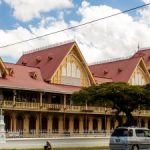
Acting Chief Justice, Roxane George is set to deliver her ruling in the house-to-house verification case. This will occur on Friday, March 28.
On Monday, Justice George grilled Attorney-at-Law Dexter Todd on the declarations sought in the case brought by his client, People’s National Congress Reform (PNCR) Chief Election Scrutineer, Carol Smith-Joseph.
Smith-Joseph wants the High Court to direct the Guyana Elections Commission (GECOM) to conduct house-to-house verification of the addresses provided by registrants.
She has asked the Court to declare that the National Registration Act requires not only the verification of the existence of addresses claimed, but also that the applicants live at, or are connected to those addresses.
However, as the oral arguments commenced on Monday in the High Court, the Acting Chief Justice raised questions on the issue of residency.
Acting Chief Justice George has established in previous rulings that residency is not a requirement for Guyanese to vote in the General Elections under the Constitution. She maintains that position.
Attorney Todd told the Court that electors must register within in their geographic location, and ought to be connected to the addresses that they provide as part of their registration. He stressed that those addresses must be verified, and warned that failure to verify the addresses can corrupt the electoral system.
But the Acting Chief Justice stated that regardless of the address provided, once a person is Guyanese and 18 years or older, that person is eligible to vote.
“They are still an elector,” Chief Justice George said, while questioning whether a voter can be allowed to vote in the General Elections, but disqualified from voting in the Regional Elections due to an unverified address.
She said while the Elections have two components – General and Regional – the Constitution makes it clear that residency is not a requirement for Guyanese to vote.

“A person cannot be enfranchised and disenfranchised at the same time. It doesn’t make sense,” the acting Chief Justice said, while further grilling Todd on the practicality of his arguments.
But Todd stated that in the absence of any real verification, and in a system that allows registrants to provide addresses with vacant lots or unused dilapidated buildings, there would be room for manipulation.
Outside of the Courtroom, the Attorney told reporters that verification is an important issue that must be addressed by the Court.
“What is actually before the Court is not a simple, not a complex, but a vital question to be answered in relation to verification. Now, the applicant’s contention is that the NRR (National Register of Registrants), when you register, that information goes into the NRR, and the information from the NRR is then extracted depending on which elections you are dealing with whether you are dealing with General Elections, Regional Elections, Local Elections. Now, what the contention is, is that GECOM has a responsibility to ensure that the information being inputted into the NRR is accurate,” he told reporters.
Meanwhile, back inside the Courtroom, Attorney General Anil Nandlall said the Todd’s inability to clearly respond to the questions posed by the Court is an indication of the weakness of the case.
The Attorney General told the Court that the issue of “residency” was adequately addressed in the House-to-House Registration Case in 2019, when the acting Chief Justice ruled that residency was not a condition for registration.
Further, the Attorney General argued that while GECOM was mandated to verify the addresses of registrants in the past, the National Registration Act was amended following the 2020 Elections to bring it in conformity with the Constitution of Guyana.
He argued further that it would be unconstitutional to prevent someone from registering in a location because his or her address maybe deemed flawed by GECOM Registration Officers.
“Anytime, any person is refused registration or would be refused the right to vote because of some deficiency in their address that would be an abrogation and a violation of not only the constitution but that person’s constitutional right to vote, and that is what that case is about,” the Attorney General said.
He further stated that “a Registration Officer cannot now tell you that you must have a connection with the address. He is asking you to undo what we did in 2022, and to make the Law inconsistent with the Constitution”, adding that “verification used to be in the law, that is no longer the law.”

Minister Nandlall warned against imposing a requirement that is not catered for in the Constitution.
However, Counsel for the Guyana Elections Commission, Kurt Da Silva told the Court that while the application is trying to undo the Amendments to the National Registration Act, it is a fact that there are two separate elections – General and Regional- and while residency is not a requirement for General Elections, persons voting in the Regional Election ought to be residing in the geographical location to vote.
He argued that a person can be constitutionally entitled to vote in the General Elections, but constitutionally barred from voting in a specific Regional Election.
While both elections are currently done simultaneously using a single list and a single ballot, Da Silva hinted at the possibility of having several lists and ballots for the two elections.
General and Regional Elections are schedule to take place in Guyana later this year. (Svetlana Marshall)












You must be logged in to post a comment Login